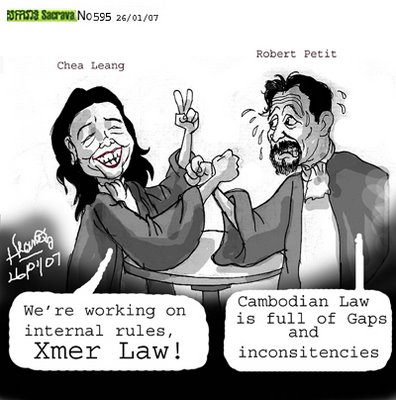
Khmer Rouge Tribunal - Interview with a Co-prosecutor
2007.01.24
by Dan Southerland
Khmer Rouge Trial Prosecutor Robert Petit, Photo: RFA
PHNOM PENH—When it comes to international war crimes trials, Robert Petit seems to have done it all.
Following stints in Rwanda, Kosovo, East Timor, and Sierra Leone, the veteran Canadian prosecutor is now facing one of his biggest challenges—developing cases for Cambodia’s long-awaited Khmer Rouge tribunal.
Towards the end of last year, the U.N.-backed effort to open the tribunal ran into serious difficulties when Cambodian and international jurists failed to reach agreement on internal procedures.
The two sides are now making a new effort to overcome differences.
Critics argue that Cambodian judges are subject to political interference from the Cambodian government, making it difficult to hold fair trials.
So I think that overall in six months we have a pretty good record, especially considering the limited resources we have.
Khmer Rouge Trial Co-Prosecutor Robert Petit
Unlike the trials dealing with the former Yugoslavia, Rwanda, Sierra Leone, and East Timor, the Cambodian tribunal will be more closely linked to Cambodian law.
And, as Robert Petit acknowledges, Cambodian law is full of “gaps and inconsistencies.”
'A lot of progress'
Some critics suspect that the Cambodian government has been using its influence to delay progress toward the opening of the tribunal, partly because of a fear that the findings could implicate or embarrass members of the government, some of whom are former Khmer Rouge themselves.
Petit, who is a co-prosecutor working with a Cambodian counterpart, declines to speculate about Cambodian government motivations or possible delaying tactics. He argues instead that he and the other jurists involved are making good, steady progress.
“I don’t comment on speculation,” said Petit in an interview with Radio Free Asia. “I don’t think that would be wise on my part.”
“We’ve made a lot of progress, more than other tribunals [at this stage]. We have investigators who have started amassing a fair amount of information. We’ve developed cases. And we have a pretty good idea already of where we’re going to go.”
“So I think that overall in six months we have a pretty good record, especially considering the limited resources we have, compared with any other tribunal that I know about.”
Khmer Rouge Trial Co-Prosecutor Chea Leang. Photo: RFA
Petit served as a criminal prosecutor in Montreal for nearly a decade. Then he decided to try something different. He launched a new career as an international prosecutor.
From 1996-99, he worked as a legal officer in the prosecutor’s office of the International Criminal Tribunal for Rwanda. From 1999-2004, he served in quick succession as a legal adviser with the U.N. mission in Kosovo, a prosecutor with the U.N. mission in East Timor, and senior trial attorney with the Special Court for Sierra Leone.
Petit sees similarities between the Khmer Rouge case and those of other war crimes trials. But he also sees significant differences.
As for similarities, he says, “It’s always about victims, isn’t it? And trying to bring justice for somebody whose rights and integrity have been violated. To a certain extent, it’s always the same.”
But then he finds huge differences in Cambodia.
We have strong cooperation and good relations and good planning to achieve the purpose of our mission.
Co-Prosecutor Chea Leang
To begin with, much time has passed. The Khmer Rouge began their full-scale reign of terror more than 30 years ago, in April 1975.
Many Cambodians have been reluctant to talk about what happened and their government has not encouraged discussion. School textbooks barely touch on the subject.
Many are still confused as to why the Khmer Rouge killed so many innocent people. By some estimates up to two million people died from executions, starvation, and overwork.
“Obviously the passage of time is a big factor,” says Petit. “There is a lack of understanding about what happened.
“In Rwanda, you knew why you were being killed. It was because you were a Tutsi. And the government had been saying for 30 years that the Tutsi were the enemy. Here that’s not the case. A whole generation grew up not really learning about this. And there are all those survivors who don’t really want to tell their children what happened to them.
“There’s a knowledge gap that did not exist in some other cases. It’s not either harder or easier to deal with—just different.”
Since last July, Petit has been working on a regular basis with a Cambodian counterpart, East-German trained co-prosecutor Chea Leang.
“We’re working very well together,” says Petit.
In a brief interview, Chea Leang agreed. “We have strong cooperation and good relations and good planning to achieve the purpose of our mission,” she said.
Does she believe that trials will begin this year?
“Now we are working on internal rules,” she says. “If we agree on those, we expect a trial to take place in 2007.”
Asked if he expects to see trials this year, Petit says: “Yes. I would hope so. And I’d be very surprised if we didn’t have trials. I’d be very disappointed. There must be. There’s no way around it. There must be.”

No comments:
Post a Comment